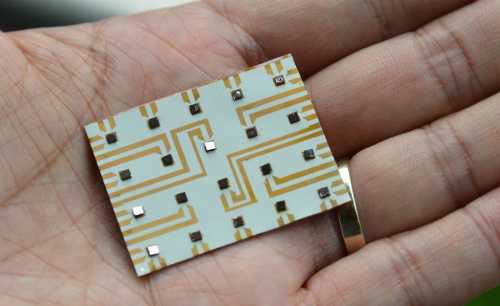
The HCMC Hi-tech Park Management Board (SHTP) said that it has granted licenses to four MEMS (microelectro-mechanical systems) projects in the last year with total investment capital of VND2.128 trillion.
Of the projects, the biggest is capitalized at VND770 billion, developed by a US-based company whose director is a Viet Kieu (overseas Vietnamese) businessman.
According to experts, a high number of sensors of different kinds, including those to measure inertia, pressure, light, temperature, magnetism and sound, will be needed.
“MEMS is a promising technology for the smart city using IoT thanks to a lot of advantages, including small size, high performance, low energy consumption and production cost,” explained Dzung Dao from Griffith University in Australia.
Of the projects, the biggest is capitalized at VND770 billion, developed by a US-based company whose director is a Viet Kieu (overseas Vietnamese) businessman.
According to experts, a high number of sensors of different kinds, including those to measure inertia, pressure, light, temperature, magnetism and sound, will be needed.
“MEMS is a promising technology for the smart city using IoT thanks to a lot of advantages, including small size, high performance, low energy consumption and production cost,” explained Dzung Dao from Griffith University in Australia.
Le Hoai Quoc, head of SHTP said, SHTP Labs has also cooperated with the investors from the US and Japan, such as Hello Life, Microlux, Chinowa and MTEX in technology transfer, training and R&D to manufacture specific chips.
A project on manufacturing 1,000 pressure sensing chips is being implemented.
SHTP Labs has received the first order from the HCMC Urban Drainage Company (UDC). The company wants five sets of urban flood monitoring devices which can measure rainfall, water level and authenticate field images at high standards.
Scientists commented that HCMC strives to develop a smart city in the conditions of the low-level development of the microchip industry.
The first research works on MEMS began in early 2000 at some universities and academies. However, the achievements remain modest and none of the centers has adequate equipment and qualified technicians.
However, the progress in attracting investment and research in the last year has increased the feasibility of the smart city building.
HCMC Mayor Nguyen Thanh Phong said the municipal authorities have signed cooperation agreements with the Ministry of Science & Technology, Viettel and VPPT, and has established the Semiconductor Technology Association to join with Japanese partners to train high-quality human resources. The investment projects in IC industry receive big investment incentives.
The projects on manufacturing electronic circuits, integrated circuits and sensors are covered by the city’s investment stimulus program under which each project can receive loans of VND200 billion.
HCMC is also making hectic preparations for human resources development for the smart city in the future. Prof Susumu Sugiyama from Ritsumeikan University in Japan estimates that 50 workers are needed to operate a small-scale MEMS factory which can put out 100,000 devices a month.
Meanwhile, Nguyen Xuan Thuy from MTEX Vietnam says that it is time for Vietnam to develop wafer production, the most important phase in semiconductor IC manufacturing.
